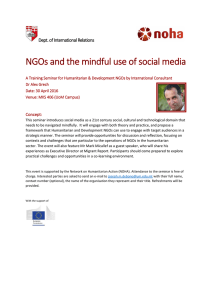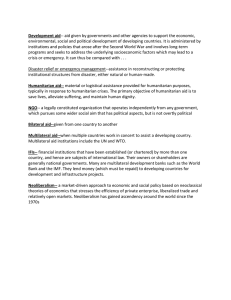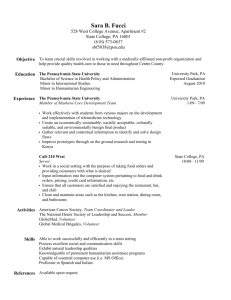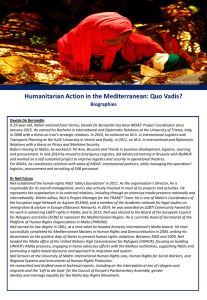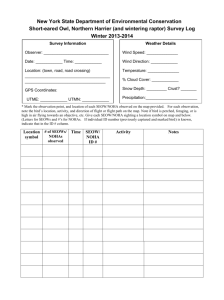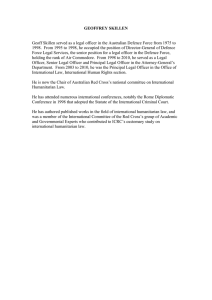Dept. of International Relations
advertisement
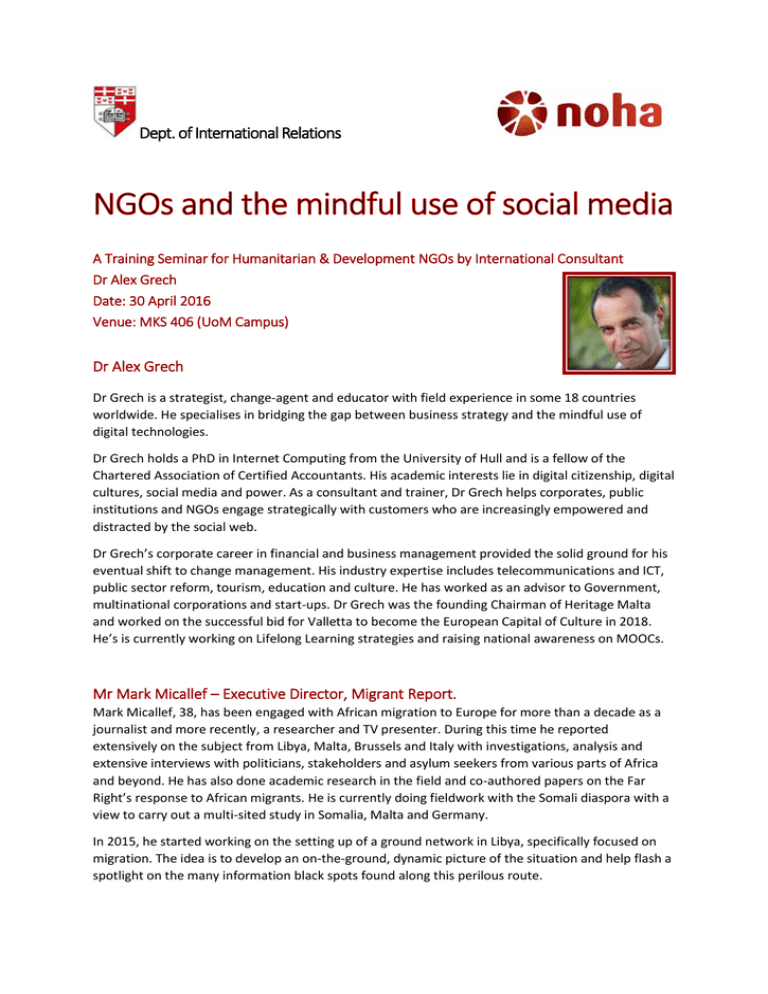
Dept. of International Relations A Training Seminar for Humanitarian & Development NGOs by International Consultant Dr Alex Grech Date: 30 April 2016 Venue: MKS 406 (UoM Campus) Dr Alex Grech Dr Grech is a strategist, change-agent and educator with field experience in some 18 countries worldwide. He specialises in bridging the gap between business strategy and the mindful use of digital technologies. Dr Grech holds a PhD in Internet Computing from the University of Hull and is a fellow of the Chartered Association of Certified Accountants. His academic interests lie in digital citizenship, digital cultures, social media and power. As a consultant and trainer, Dr Grech helps corporates, public institutions and NGOs engage strategically with customers who are increasingly empowered and distracted by the social web. Dr Grech’s corporate career in financial and business management provided the solid ground for his eventual shift to change management. His industry expertise includes telecommunications and ICT, public sector reform, tourism, education and culture. He has worked as an advisor to Government, multinational corporations and start-ups. Dr Grech was the founding Chairman of Heritage Malta and worked on the successful bid for Valletta to become the European Capital of Culture in 2018. He’s is currently working on Lifelong Learning strategies and raising national awareness on MOOCs. Mr Mark Micallef – Executive Director, Migrant Report. Mark Micallef, 38, has been engaged with African migration to Europe for more than a decade as a journalist and more recently, a researcher and TV presenter. During this time he reported extensively on the subject from Libya, Malta, Brussels and Italy with investigations, analysis and extensive interviews with politicians, stakeholders and asylum seekers from various parts of Africa and beyond. He has also done academic research in the field and co-authored papers on the Far Right’s response to African migrants. He is currently doing fieldwork with the Somali diaspora with a view to carry out a multi-sited study in Somalia, Malta and Germany. In 2015, he started working on the setting up of a ground network in Libya, specifically focused on migration. The idea is to develop an on-the-ground, dynamic picture of the situation and help flash a spotlight on the many information black spots found along this perilous route. Formerly a News Editor at the Times of Malta, Mr Micallef has worked in the field and managed the organisation’s multimedia newsroom. As a journalist and co-host of a weekly current affairs programme, he developed a wide-ranging interview portfolio that includes TV and newspaper pieces with international politicians, criminals and their victims, as well as inspirational figures. He has also reported extensively from Libya, both before and after the overthrow of Muammar Gaddafi, as well as during the 2011 revolution itself, with dispatches from Benghazi, Ajdabija and Ras Lanuf during the rebels’ advance on Sirte – where Gaddafi was eventually found and killed. A substantial part of his work also involved investigative work. Recent examples from 2014 saw him locate two Maltese businessmen wanted for suspected fraud in the UK and Dubai. NOHA. The Network on Humanitarian Action (NOHA) is an international association of universities that aims to enhance professionalism in humanitarian action through education & training, research & publications and projects. As a network of academic institutions, NOHA brings a university ethos to the existing humanitarian principles that govern humanitarian action. NOHA was born from the idea that higher educational institutions have an essential role to play in enhancing professionalism in the delivery of humanitarian assistance through education. In 1993, the 5 universities that composed NOHA at the time set on board the pioneering task of finding space for universities among the then limited humanitarian stakeholder mix. They established a network of universities across Europe delivering a multidisciplinary Masters programme that would be managed and administered by academics from a range of related disciplines. NOHA is today a growing network of 12 European member universities and 5 global partner universities from different continents. The institutions share a commitment to humanitarian action and cooperate in joint educational and training programmes, research and projects. NOHA believes that humanitarian action must be an effective and ethical expression of human solidarity. This should be achieved by joining efforts through a professional and ethical management of humanitarian action by policy makers, managers, and humanitarian workers. NOHA is driven by the challenge to keep pace with the changes and complexities in and of the sector. It is guided by a strong vision on how education can effectively contribute to relieve the suffering of populations affected by crises and disasters. Central to its growth and evolution was a core set of principles that places NOHA in a space equally shared by universities and humanitarian organisations; these are values such as academic rigor, shared learning, respect for peer institutions, and humility together with the humanitarian principles of neutrality, impartiality, independence, and humanity. For more information, please visit www.nohanet.org. With the support of
